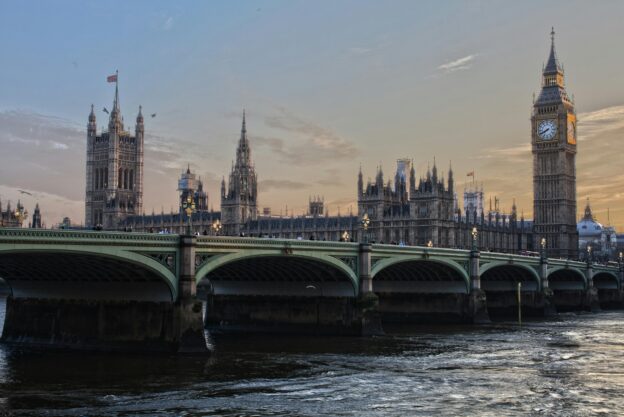GK Senior Adviser James Allan visited the farmers protest in Westminster and assesses the likelihood of a government u-turn and its agriculture policy plans.
On 19 November, farmers were out in force and took to the streets of Westminster for a heartfelt protest for a sector that feeds the nation. At the autumn budget, the Chancellor Rachel Reeves introduced a cap of £1m for assets eligible for Agriculture Property Relief and Business Property Relief. Estimated to raise £0.5bn a year by 2029/30 for spending on public services, the measure has been dubbed a ‘family farm tax’ for farmers that “don’t do it for the money because there is none”.
The extent to which the Chancellor’s action equates to a “death knell” for the family run farm is somewhat contested. While the Country Land and Business Association estimates 70,000 farms will be impacted by the change, various policy wonks and tax specialists argue that this does not consider other reliefs and is based on the quantity of farms, rather than ownership structures. Disputed figures aside, it risks fueling a shift public opinion against the government and one of the shortest-lived honeymoon periods for a new Prime Minster. A survey carried out by JL Partners found that 53% of respondents felt the autumn budget was unsuccessful, so the farming community are not alone.
Is this Reeves’ Cornish pasty tax moment?
When then-Conservative Chancellor George Osborne introduced a 20% tax on hot foods to end VAT anomalies in 2012, few anticipated the political drama of “pastygate” which ensued. The Conservative government was criticised for being out of touch, with some commentators even alleging class war. Then Prime Minister David Cameron was caught out for saying he’d eaten a pasty in Leeds Railway Station when the West Cornwall Pasty Company duly noted that the pasty outlet had closed two years previous. The controversy detracted from Osborne’s budget and ultimately led to a government u-turn and a negative with 49% of people describing the government’s handling of pastygate as a “shambles”. In a similar vein, the political fallout from this protest will be difficult for the Labour government to manage. Whatever Reeves’ next move, pastygate demonstrates that u-turns are not unprecedented when public opinion moves against a pinch point policy issue.
Beyond the political drama
Politics aside, the protests cut to the core of several interrelating policy issues, chief among them food security. Should farmers up the stakes and choose to strike, the government has already confirmed contingency plans to mitigate against likely food shortages. Any disruption to already fragile “just in time” food supply chains, which are a hallmark of the British supermarket industry, would have an immediate knock-on effect for the consumer, and in turn, the voter. This year of global elections has demonstrated that voters do not reward incumbents when food prices rise.
Yet given the 60/40 split of domestic and imported food produce respectively, the issue of food security is both desperately domestic and international. Russia’s invasion of Ukraine not only led to record levels of food inflation, hitting low-income households the hardest, but also a decline in business investment in the UK food and drink sector. Then there’s the issue of climate change. While India and Pakistan account for roughly 46% of UK rice imports, the government acknowledges that India is increasingly a climate vulnerable country. In short, a greater dependence on food imports arising from a possible collapse of domestic farming exposes the UK to yet more unpredictable geo-political and climate risks.
The British farming sector does not operate in isolation; it is critical to the UK’s broader rural economy, supporting industries such as agricultural machinery, agri-tech and innovation, and food processing. More than this, farmers are custodians of the UK countryside, contributing to environmental goals of biodiversity, carbon sequestration and sustainable land management and forestry. Though contentious, the Chancellor’s action prompts a broader conversation about agricultural reforms which align with national priorities and ensures the voice of the farming community is heard. The government has yet to set out substantive details but spoke of a new deal for farmers during the election campaign. Now in government, Defra Secretary Steve Reed has signalled a focus on trade deals undercutting low welfare and low standards; maximising public sector purchasing power to back British produce; and a land-use framework to balance nature recovery and long-term food security.
Whether Reeves doubles down or pivots on the Agriculture Property Relief depends on the government’s willingness to expend political capital to defend its decision. Labour’s instinct will be to fight on but the party finds itself on new ground. Its broad but narrow majority is part contingent on non-traditional Labour voters, many of them in rural areas. The MPs in these constituencies will have their eyes on a 2029 general election. Maintaining the rural vote and positioning Labour as the party of both rural and urban communities will be a challenge for the government. How Starmer and Reeves handle the ‘family farm tax’ could well define this iteration of the Labour Party. For investors and businesses alike, keeping abreast of these political battlegrounds, and preparing for the associated commercial risks and opportunities, will be important in making the case to a government that might well bend to a shift in public opinion.






